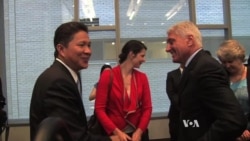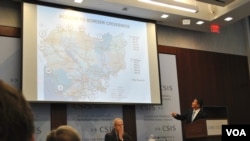Cambodian Commerce Minister Sun Chanthol concluded a trade mission in the United States this week, emphasizing his government’s willingness to make “deep” reforms to improve its investment climate.
The minister made those comments at a presentation on Monday at the Center for Strategic and International Studies in Washington, at the conclusion of a one-week trade mission that also took him to Los Angeles and Seattle.
“We carry out these reforms to help investors so that there will be less informal costs, less transportation costs, less energy costs, and [we will] train our people to have better skills,” he said.
Sun Chanthol admitted that the new-found political will is due to last year’s general election.
“If we want to win the election in 2018, to be relevant, you stick to your reform agenda and do it quickly, do it fast,” he said. “If not, you will not be there. That’s why we understand that we must reform. Without reform, we are going to have a problem in 2018.”
During the July 2013 election, the ruling Cambodian People’s Party saw a significant drop in parliament seats, from 90 to 68. A public opinion survey conducted by the International Republican Institute after the election found a significant drop in public optimism about the country’s direction. The most-cited reasons were corruption, nepotism and damage to the environment.
Cambodia meanwhile needs more foreign investment to create jobs for the 300,000 young Cambodians who enter the job market every year and to help ready itself for the Asean economic integration at the end of 2015.
Alex Feldman, president and CEO of the US-Asean Business Council, who attended the talk Monday, told VOA Khmer that investment interest in Cambodia has steadily grown. But he said investors need more evidence of reform.
“What the minister was talking about today was all very positive and all things that will attract business,” Feldman said. “We have seen progress. It’s probably not been as much as the US investors or the government would like. Hopefully, this time we make more progress. But we’ll have to wait and see.”
Feldman said Cambodia should continue to improve infrastructure, improve the skill base of its citizens and fight corruption.
In 2013, Cambodia dropped to become the most corrupt country in Southeast Asia, according to Transparency International, and slipped in global competitiveness while the rest of the region improved.
However, Sun Chanthol noted that Cambodia has taken “unprecedented” steps toward economic reform, including the passing of an anti-corruption law and the creation of an anti-corruption unit.
Sun Chanthol, who has headed the Commerce Ministry since September last year, says he has encouraged a more merit-based system of staff promotion and pushed the automation of business certificates in an effort to cut down on “informal” costs, a euphemism for bribery.
Storm Tiv, senior associate for the Asia division at Human Rights Watch, told VOA Khmer at the CSIS talk that while anti-corruption efforts increased after the election, the lack of transparency in the process will make it ineffective.
“The lack of the ability to publicly disclose the assets of ministers keeps corruption as an issue,” he said. “And so unless assets are publicly disclosed, corruption is still going to be an issue. The existence of an anti-corruption unit, then, doesn’t seem to show any real difference in how Cambodia addresses corruption.”
Participants at the minister’s talk seemed cautiously optimistic about Cambodia’s reform plans, but they said only time will tell if those promises will materialize.
Stay tuned to VOA Khmer's upcoming exclusive interview with Minister Sun Chanthol about investment potential, economic reforms, and Asean integration.












